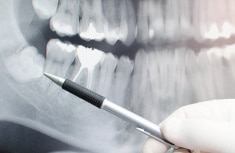
- Severe decay
- Advanced periodontal disease
- Severe mobility of teeth
- Infection or abscess that cannot be resolved with root canal treatment
- Fractured teeth/roots
- Impacted teeth
- Orthodontic correction
- Wisdom teeth
After a tooth is extracted, some discomfort is normal but can be minimized using painkillers, antibiotics (in some cases), and ice packs applied to the face. This discomfort should decrease within two to three days; if it does not or worsens, please contact our office immediately.
Wisdom Teeth

Wisdom teeth, also known as “third molars,” are the last teeth that develop in the back of the mouth, typically coming in between the ages of 16 and 20. The jaw can become impacted or misaligned when it is not large enough to accommodate wisdom teeth. Impacted wisdom teeth may lead to:
- Damage to adjacent teeth
- Pain and discomfort
- Infection
In some cases, wisdom teeth need to be extracted. If there is enough room and the wisdom teeth are healthy and not causing any damage, they may remain in the mouth. Our dentists will evaluate the tooth with an X-ray to determine whether extraction is necessary.
For wisdom teeth extractions, we routinely use:
- Local anesthetic
- Nitrous oxide (laughing gas) and minimal sedation, available upon request

